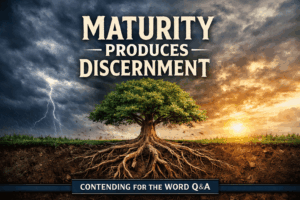⏱️ Estimated Reading Time: 5 min read
About two weeks days ago, billions of Christians celebrated Easter, albeit virtually. Notwithstanding the rest of what it does, Easter reminds us of that the pattern of Jesus’ life is the pattern for Christians: that life and death—and yes, even resurrection—are preceded by suffering. Although suffering is painful, it’s part of the Christian vocation, albeit temporarily, because suffering eventually gives way to glory (1 Peter 5:10).
Suffering More Acutely
Like everyone else, Christians are suffering more acutely right now. The COVID-19 pandemic, which has led to sharp increases in joblessness, shrinking 401(k) accounts, and tens of thousands of unexpected deaths, has touched each of us in one way or another. Businesses, like my wife’s (she works in commercial interior design), are constricting, and families are having to say goodbye to loved ones via FaceTime.
While there remains much that is good, true, and beautiful in the world, including what Ephraim Radner, of Wycliffe College, describes as opportunities “to turn to God, to reckon God’s gifts, [and] to tend and cherish common responsibilities and the life given through birth, children, and parents,”[i] suffering nevertheless abounds. Although it isn’t wrong to try and fix problems or suffering, the Christian knows that suffering, as well as our inability to contain or control it, is part and parcel of life.
Of course, several ill-informed—although perhaps well-meaning—groups, like name it and claim it Christians, and men and women of countless other persuasions, would have us believe otherwise. When we stop and consider whether God is at work in our suffering, it causes us to revisit “our assumptions about God’s benign supervision and our ability to control suffering.”[ii] And this is akin, at least in the minds of men and women of countless other persuasions, to surrender, to admitting defeat in the face of this hidden enemy. But resilient Christians don’t admit defeat. Or so we’re told.
Suffering is Part of the Christian Vocation, but Easter Comes for the Christian
The groups mentioned above are wrong. Suffering is part and parcel of all life after the Fall. The entirety of Creation is full of thorns and thistles (Genesis 3:18); and the great sufferings of the earth—be they physical or emotional, social or psychological—come for us all (Acts 14:22; 1 Corinthians 1:3–4).
We may resist it, but unlike the coronavirus, none of us is immune to suffering. While suffering may be part of the Christian vocation, Easter reminds us that suffering doesn’t get the last word. Instead, our suffering is only temporary; it is a “light momentary affliction,” intended to “prepar[e] for us an eternal weight of glory beyond all comparison” (2 Corinthians 4:17). And how do we know this? By looking to Jesus.
Though our suffering is different than Jesus’ (1 Peter 2:21–24), Easter reminds us that because Jesus is alive, we too may have hope in a world chockful of suffering, sin, and death (Romans 8:11). Like the death Jesus died, the suffering and sin under which we are currently living are only temporary. One day soon, the Christian will also be raised; and his life, held down in a makeshift grave, as it were, will spring forth and be made new (Romans 6:5).
Suffering Gives Way to Glory
Scripture teaches that the resurrection of Jesus is the great hope for the Christian (1 Corinthians 15:12–28). But often, it is in remembering that God is at work in tragic and overwhelming events that makes life bearable, even beautiful. Indeed, this is the hope of Easter: that although the Christian should not pretend that he knows for certain what will happen, what God will do, or where he’ll end up,[iii] he need not fear tragic and overwhelming events—like the COVID-19 pandemic—because Jesus has suffered, sacrificed, and is sanctifying His people (Hebrews 10:10).
Our suffering, as Dostoevsky was wont to remind us in The Brother’s Karazov,[iv] will soon “be healed and made up for. . . . [I]n the world’s finale, at the moment of eternal harmony, something so precious will come to pass that it will suffice for all hearts, for the comforting of all resentments, for the atonement of all the crimes of humanity, for all the blood that[‘s been] shed; that it will make it not only possible to forgive but to justify all that has happened.”
In a word, as it was for Jesus, so it will be for the Christian: life, death—and yes, even resurrection—but first, Christians must suffer (John 16:33). Unlike the world, however, Christians suffer in hope because they know suffering eventually gives way to glory, and “the God of all grace, who has called [us] to his eternal glory in Christ, will himself restore, confirm, strengthen, and establish [us] (1 Peter 5:10). Thanks be to God!
[i] Ephraim Radner, “The Time of the Virus,” First Things (March 16, 2020), https://www.firstthings.com/web-exclusives/2020/03/the-time-of-the-virus (last visited April 19, 2020).
[ii] Ibid.
[iii] Ibid.
[iv] Fyodor Dostoevsky, The Brothers Karamazov: A Novel in Four Parts and an Epilogue, trans. Constance Garnett (New York: Macmillan, 1922), 247–48.




